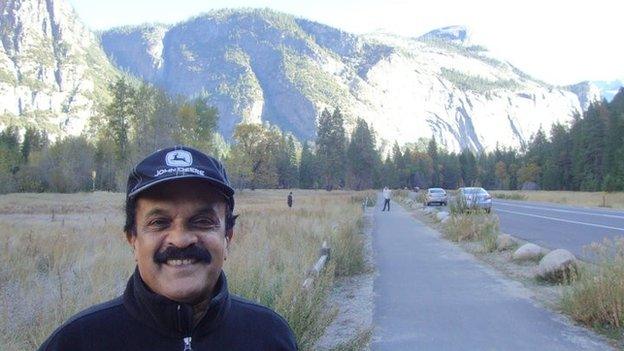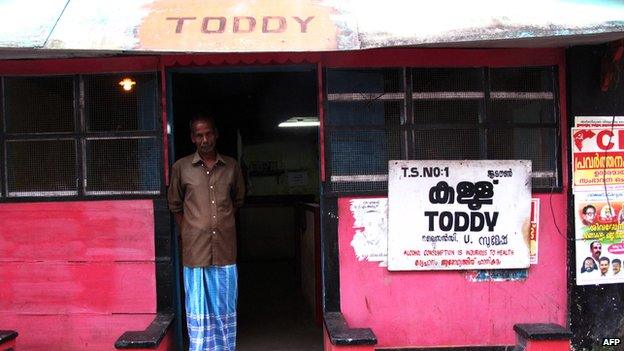A writer's tale of being a drinker in Kerala
- Published

Paul Zacharia goes off alcohol for a few months every year
Paul Zacharia, writer of more than 50 books of novels, short stories, travelogues and essays, is one of Kerala's leading cultural personalities. He spoke to Soutik Biswas on his relationship with alcohol as the state announced it would institute a ban on alcohol., external
I come from a Catholic Christian farming family in Kerala and in our community it was common for people in our village to drink.
Every family would have a coconut farm. The "toddy tappers" would arrive in the morning, extract toddy [palm wine] from the coconut sap and give us a bottle or two before going to the toddy shop to sell it.
The toddy would ferment during the day and become a bitter and strong drink - rather like wine - by the evening.
But the sweet toddy that we were given in the morning found its way to the kitchen - women would make appams (pancake made with fermented rice batter and coconut milk) from it - and the breakfast table, where children would be given a glass.
Nothing sinful
So I, like other children, would have a glass of sweet toddy every morning, a pleasant protein drink of sorts. Women would also drink. There was nothing special or sinful about it.
In school, I began going out with my friends and we picked up the real thing: a bottle of a stiff toddy drink which would cost two to three rupees in the 1960s. We thought we were creating a revolution, however illusory it was.
This continued in college. To prove to your buddies that you were becoming a man, you went out with friends and drank toddy.
Over the next few years, I lived in the cities of Mysore and Bangalore for higher studies.
There I was initiated in the joys of drinking whisky, brandy and rum. In Bangalore, I think, we drank mostly beer which cost 1.60 rupees a bottle, and there was quite a bit of binge drinking going on.
I had finally become a fairly seasoned drinker. I returned to Kerala in the late 1960s with a teaching job and began working in a college.

Kerala has the highest per capita consumption of alcohol in India
Those were the years of big drinking, mostly with friends. Why did we do it? I do not really know. Maybe, we were alienating ourselves from the dreary life around us. Maybe, it was to enjoy the company of friends. I had a lot of friends and we drank regularly.
After four years in Kerala, I moved to the capital, Delhi, to work as a copy editor. I became a member of the city's Press Club, a favourite drinking hole, and continued with my habit.
I returned to Kerala and 1993 to work for a media company and immediately noticed a spurt in drinking around me. The number of bars in the cities had increased and more people were drinking hard liquor.
One of the reasons was the declining quality of toddy after the toddy trade had been taken over by politicians belonging to all parties. Adulterated and contaminated toddy flooded the market. Lovers of drink who could afford it flocked to the bars.
I am 69, and continue to enjoy my drink.

Factfile on Kerala alcohol ban

Kerala outlined plans to ban the sale and consumption of alcohol in August
State aims to enforce total prohibition in 10 years
Kerala has India's highest per capita alcohol consumption at more than eight litres per person yearly
Kerala children have their first drink at 13.5 years - in the rest of India it's 17 years
Alcohol contributes 22% of Kerala's revenue
State exchequer stands to lose 90bn rupees ($1.49bn; £897m)

However, I stop drinking for two to three months every year to clean up and detoxify myself. When I travel, I bring back some good whisky and cognac. I try to keep some good wine.
I try to be careful. I have lost so many of my friends to drink in Kerala - some of our top writers, filmmakers, theatre personalities - many of them were cultural giants.
I really don't think Kerala and its people have any special relationship with alcohol. There are people in other southern and northern states who drink heavily too. But it is true that the government makes a lot of money from the sale of liquor, the health of our exchequer depends on alcohol.
The government's recent move to impose gradual prohibition in Kerala is nothing short of madness in my view.
By banning alcohol and shutting down bars, you will be driving the trade underground and allow the state monopoly to make more profits as the only bona-fide suppliers of alcohol. Alcohol, anyway, has become very expensive here.
Lack of careful and responsible drinking has created familial and emotional problems for people in Kerala. But banning alcohol is no way to solve the problem.